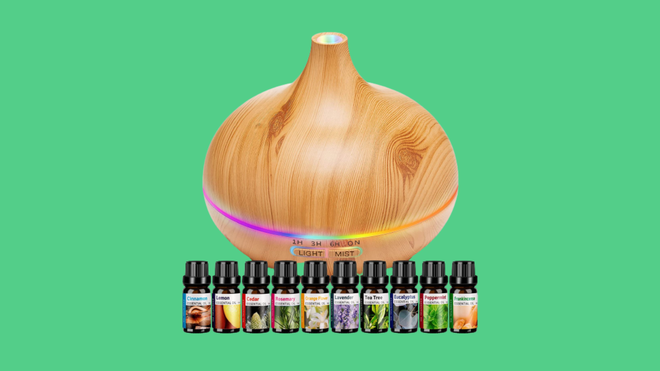Make sure to stop and smell the roses. It just might boost your memory.
Most people think of smell as the least important of their five senses. But a growing body of research suggests smell is not just essential for perceiving things like food and flowers but also for remembering them.
And a new study suggests stimulating the sense of smell can boost memory.
Older adults exposed to odors while they slept performed better on verbal memory tests and showed improved function in a brain pathway that supports memory formation, according to the study, published in the journal Frontiers in Neuroscience.
"I would consider it preliminary, but I think it's pretty exciting," said Donald Wilson, a neuroscientist at NYU Langone Health, who was not involved in the research.
"It's an important first step in showing how very simple odor enrichment can influence or at least protect against degeneration," said Leslie Kay, a professor of psychology and neuroscience at the University of Chicago, who was not involved in the study.
A number of neurological diseases, including Alzheimer's, Parkinson's, schizophrenia and depression, are preceded by a loss of smell. And it has long been known that damage to the sense of smell ‒ whether it comes from aging, exposure to toxins, smoking, head injury, menopause or a chronically stuffy nose ‒ can lead to memory loss.
"As you age, your memory walks hand in hand with your ability to smell things," said Michael Leon, who led the new research.
"We think that pretty much everybody in our modern, affluent world is odor deprived," said Leon, a professor of neurobiology and behavior at the University of California, Irvine. "The loss of stimulation may make their brain vulnerable to a wide variety of problems."
The study was small, comprising 43 healthy volunteers, ages 60 to 85. But the half who were exposed to seven odors two hours a night for four months performed 226% better on a verbal memory test than those whose diffusers had no scent. They also showed differences in brain scans.
"People are really desperate to find something for their memory," Leon said. "This is something that takes no effort but is highly effective."

Explaining why this might happen
There's a biological explanation for the link between olfaction and memory, Wilson said. In the brain, the system involved in smell is only one or two connections away from brain areas involved in cognition and emotion; the systems for sight and hearing are much further from those areas.
Smell is the only sense that has a "direct superhighway into the memory centers of the brain," Leon said, "and consequently has a far greater impact (on memory) than those other senses."
Wilson said he was intrigued by the finding that of all the tests Leon and his team tried on the study volunteers, they saw only improvements in verbal memory. Most people are terrible at labeling scents ‒ they know something smells good, but they can't say "this scent is a rose," or "this one is cinnamon." That's why most odor tests offer people multiple choice options, he said.
"There's some weakness between olfaction and language that we don't really understand," Wilson said. "It's interesting that this (new trial) is affecting verbal learning."
The brain can't learn new information during sleep. Playing audio in German to a sleeping person, for instance, won't help them learn the language. But odor delivered during sleep is recognized by the brain, Wilson said. Presenting a scent while learning a list a words and again that night during sleep boosts memorization. "That's another reason to think maybe it could work," he said − slowing brain aging by stimulating it with scents during sleep.
Another recent study examined older adults with dementia and found that exposing them to 40 different odors twice a day led to a substantial memory boost. "No drug has come close to the improvements they've seen," said Leon, who was not involved in that research. "It's never too late."
Kay said a "massive" study is needed to confirm the idea that stimulating the brain with odors can boost memory or slow cognitive decline. Wilson and Kay said they will remain cautious until they see larger studies but are impressed by the findings and excited by their implications.
"It looks like there's something there, and that would be cool," Wilson said.

Stimulating smell matters more now than ever
The COVID-19 pandemic has raised the stakes for work like this, Kay said.
Roughly 15 million people lost their sense of smell for months at a time, if not permanently, after a COVID-19 infection, Kay wrote in a study last year, perhaps putting them at higher risk for cognitive problems later on.
"I think it's important for all of us to pay attention to olfactory health right now," she said.
Even mild cases of COVID-19 can lead to degeneration in brain areas connected with the olfactory system, suggesting a wave of "post-COVID dementia" might be coming.
That's why Kay is particularly excited about the possibility that sensory stimulation as tested by Leon could counter at least some of that degeneration.
"They've produced a really low-cost, easy treatment that is very promising," she said.

What it might take to stimulate memory
The scents used in the new study were pleasant ‒ "I don't want to have gross odors in my house," Leon said ‒ including rose, orange, eucalyptus, lemon, peppermint, rosemary and lavender.
The type of odor doesn't seem to matter, though it doesn't work to combine all the different odors into one, he said. Novelty is important, so more odors are better than fewer.
He doesn't believe it makes a difference whether someone is awake or asleep when they perceive the odors, but Leon said nighttime diffusers require less effort than deliberately opening spice jars or sniffing essential oils twice a day.
The odors don't disturb sleep. A bright light, loud sound or touch will wake someone up, but "you can't wake people up with odors," Leon said. "Even frying bacon doesn't work."
That's because while the other senses are wired through a part of the brain called the thalamus, which connects to sleep centers, smell does not, he said.
Leon and some colleagues have started a company called Memory Air. This year, the company will begin selling devices that can diffuse up to 40 scents twice a night with the push of a button. A final price has not yet been set, but Leon said "we will be aiming for an affordable consumer product."
Any type of diffuser, or even a spice cabinet, will work if someone can be disciplined about sniffing a wide range of scents twice every day.
The brain needs stimulation of all kinds, particularly as it ages, Leon said.
Older adults who have cataracts should get surgery so they can see better. Those with hearing problems should get hearing aids. After the isolation of the pandemic, everyone should be sure to establish or reestablish social connections. Exercise and healthy eating remain vital.
And now, Leon suggested, they should add olfactory stimulation to the list of activities they do for their aging brain.
Contact Karen Weintraub at kweintraub@usatoday.com.
Health and patient safety coverage at USA TODAY is made possible in part by a grant from the Masimo Foundation for Ethics, Innovation and Competition in Healthcare. The Masimo Foundation does not provide editorial input.
Disclaimer: The copyright of this article belongs to the original author. Reposting this article is solely for the purpose of information dissemination and does not constitute any investment advice. If there is any infringement, please contact us immediately. We will make corrections or deletions as necessary. Thank you.






